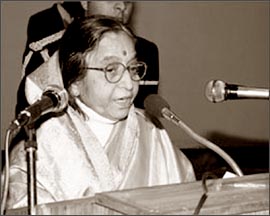Fury as India's presidential hopeful urges women to throw off 'veil
of invader'
by Jeremy Page in Delhi
The woman nominated by India's ruling Congress party to become the
country's first female president was at the centre of a national furore
after she urged Muslims to throw away their veils.
|

Pratabha Patil
|
Pratabha Patil appeared relatively uncontroversial when she was put
forward by Congress last week for the largely ceremonial but
symbolically important post. Seen as a moderate Hindu, the only
criticism levelled at the 72-year-old governor of Rajasthan was that she
lacked national stature.
By now, however, Mrs Patil's name was on the lips of Muslim leaders,
who accused her of insulting Islam. Outraged by her comment that the
veil has been imported to India by Muslim invaders, they are calling on
Congress to ditch her and choose a more secular presidential candidate.
The controversy so far seems unlikely to spark the sort of violence
between Hindus and Muslims that has so often racked India since it won
independence from Britain in 1947. It shows, however, how sensitive such
issues remain and it threatens to derail the Congress-led coalition
Government's plans to install its candidate in Rashtrapati Bhawan, the
presidential palace in Delhi.
The president, who is elected by the national and state legislatures,
has few actual powers - although he or she is supreme commander of the
armed forces and can declare a state of emergency.
However, this year's poll on July 19 is regarded as the big test of
Congress's apparently waning popularity before the next general election
in 2009.
Mrs Patil, who is a member of Congress, made her remarks about the
veil, or "purdah", at a conference in Udaipur over the weekend. "Women
have always been respected in the Indian culture. The purdah system was
introduced to protect them from the Muslim invaders. However, times have
changed. India is now independent and hence, the systems should also
change," she said.
"Now that women are progressing in every field, we should morally
support and encourage them by leaving such practices behind." Muslims
make up nearly 14 per cent of India's 1.1 billion people and many Indian
Muslim women still wear headscarves and veils. Orthodox Hindu women also
cover their faces before elderly male relatives although it is not an
obligation of their religion.
Maulana Khalid Rashid, a member of the All India Muslim Personal Law
Board, said God had asked women to wear the veil and that the tradition
was enshrined in the Koran. Yahya Bukhari, a member of the consultative
committee of the Jama Masjid, Delhi's largest mosque, called Mrs Patil's
remarks "anti-Muslim".
"It is a purely religious matter and she has no right to interfere in
matters of any religion," he said. "Pratibha Patil is an educated woman
but her statement reeks of ignorance."
Maulana Mehmood Madani, general secretary of Ulema-i-Hind, another
Muslim organisation, accused her of trying to rewrite history. "She must
apologise and withdraw her observations," The Times of India quoted him
as saying.
Historians also criticised Mrs Patil, saying that Indian women
started wearing the veil long before the Muslim Mughals invaded in the
early 16th century, led by the Timurid prince, Babur. Satish Chandra, in
his book Medieval India, said that the practice became widespread in the
13th century.
B. P. Sahu, a historian at Delhi University, said: "People are not
historically aware that the veil existed in early Indian society.
"It was a way to show respect to the elders. But the idea that the 'purdah'
system started as a result of the invasion by the Mughals is one of the
stereotypical ideas that have been taken from the works of British
historians."
Congress leaders said that Mrs Patil was simply expressing her
concern for all women in India. Sonia Gandhi, the Italian-born Congress
leader, and Manmohan Singh, the Sikh Prime Minister, confirmed yesterday
that Mrs Patil was still their nominee.
Opposition leaders, meanwhile, tried to exploit the opportunity to
promote their candidates as more secular alternatives. They remain
divided, however, with some backing A.P.J. Abdul Kalam, the current
President, and others promoting Bhairon Singh Shekawat, the
Vice-President.
Mrs Patil would be India's first female president but the country has
already had a woman Prime Minister in Indira Gandhi, who was
assassinated in 1984.
The Times
|
